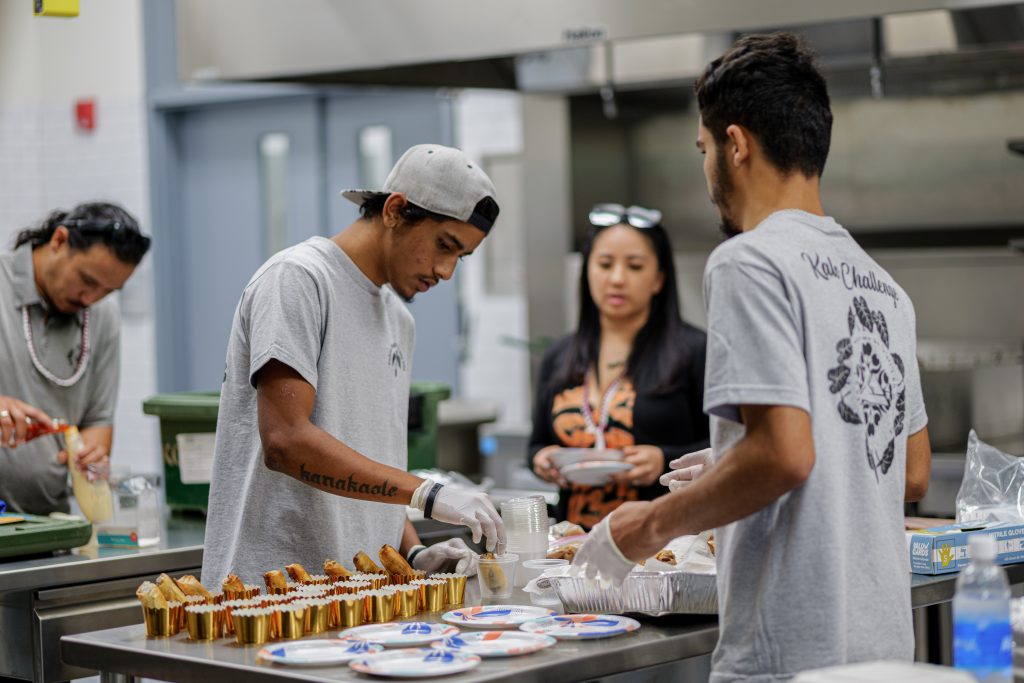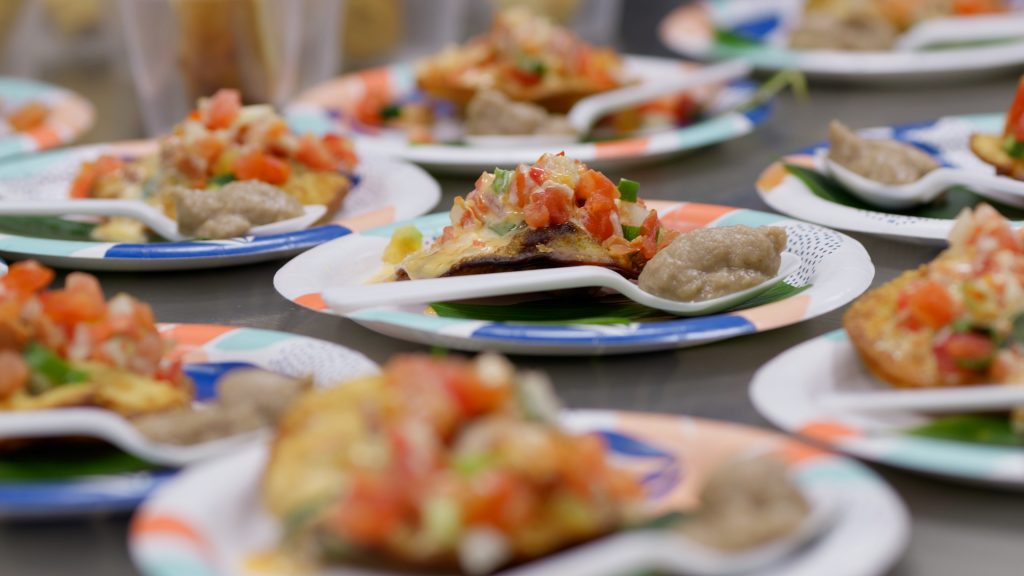Big Island students defend winning title in second annual Kalo Challenge
Students from Kōhala High School’s alternative learning program, Na‘au Oiwi, defended their winning title in the second annual Kalo Challenge hosted by the Hawai‘i State Department of Education’s Alternative Learning Programs Branch at the brand new Wahiawā Value Added Product Development Center on Friday.

The Kalo Challenge is the finale of a yearlong project where at-promise students from across the state learned about planting and cultivating kalo (taro) and then turning their harvest into an innovative culinary dish.
Kohala’s Na‘au Oiwi students created a “kalo-min,” a twist on saimin made with noodles incorporated with dehydrated kalo and ‘ulu (breadfruit), an ahi-based broth, local eggs and char siu. They also included a side of locally grown hō’i’o (fiddlehead fern) salad from their teacher’s backyard and deep-fried panko-breaded kūlolo with homemade coconut ice cream and a haupia drizzle as a dessert.
Among the finalists in the Kalo Challenge were students from Papahana o Kaiona, the alternative learning program for the Nānākuli-Wai‘anae Complex Area, who presented a “kalo-tele,” a pastele made of kalo. Students from Pāhoa High School’s Ke Ala Ula program competed in the challenge with laulau wontons with lomi salmon and a kūlolo lumpia.
The judges were Jeremy Shigekane, executive chef at Prince Waikiki; Robert Silva Jr., assistant professor and co-liaison in automotive technology at Honolulu Community College; and Alexandra Obra, principal of Waiāhole Elementary School.

“A lot of these students grow kalo at their programs anyway, but I think a lot of them didn’t have that real purpose behind it and the significance to what they were doing,” said Kristy Nishimura, Alternative Learning Branch director. “So to make it more relevant for them and keep the culture real in their lives and make it something that they can relate to, that’s why we thought about the Kalo Challenge.”
Kōhala, Pāhoa and Papahana o Kaiona students advanced from regional competitions on O‘ahu, West Hawai‘i and East Hawai‘i.
Last year students from Kōhala won the inaugural challenge with a kalo pizza made of dehydrated kalo incorporated into the dough, kalua pig topping and a poi drizzle.
“It was important (to the students) to defend the title and I think they really took on that theme,” said Kōhala High Na’au Oiwi teacher Aoloa Patao. “The push and motivation and energy to upkeep the kalo championship that they won (last year), so they were really excited about the potential to carry on the responsibility.”
The Wahiawā Value-Added Product Development Center held its grand opening last month. The 33,000-square-foot manufacturing facility is a joint project between Leeward Community College and the state to serve as a place for local entrepreneurs to incubate their business through access to small business resources, production kitchens and in-house product and process development.
“The facility is intended for education,” Nishimura said, making the location a perfect venue for the competition. “A lot of our kids are entrepreneurial in their own way, so we really want to support that … If it adds value using local products, better yet because we’re keeping it local. And they’re very creative. Whatever they’re creating for their culinary dish – if we can enhance that and make it a business, hopefully this has sparked something in them.”
Alternative Learning Programs, Services and Supports (ALPSS), which was formerly known as Comprehensive School Alienation Program, strives to provide supportive and nurturing environments that help students to grow, thrive, overcome challenges, and rise above adversity to succeed.
ALPSS assists at-promise students to improve their academic competencies and enable them to meet HIDOE-adopted state standards and graduation requirements.
Within the ALPSS setting, innovative instructional strategies are applied to re-engage and engage students in learning. Students are assisted in developing appropriate behaviors and social-emotional competencies. ALPSS provides transitional support services as at-promise students move from school to alternative programs, re-enter school successfully, graduate from high school, and prepare for positive post-secondary outcomes. Parent engagement is an essential part of the program and is consistent with the goal of partnering with the family/parents as a member of the ALPSS team.
ALPSS supports students who are experiencing difficulty in their traditional learning environment (classrooms or schools), and who may be better served at the school-level Empowerment Opportunity (EO) or complex area/district-level Alternative Learning Opportunity (ALO).
Sponsored Content
Comments









_1770333123096.webp)


